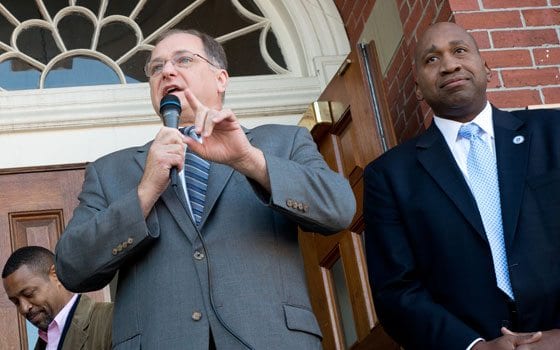
A coalition of community activists and elected officials urged Massachusetts voters to support a ballot measure that calls on Congress to support social programs, increase taxes on the rich and cut military spending to fund domestic priorities.
Joining the community activists at the Codman Square press conference were elected officials including U.S. Rep. Michael Capuano, state Rep. Russell Holmes and at-large City Councilor Felix Arroyo.
The coalition is behind Ballot Question 4, a non-binding referendum that will appear on the ballot in 24 state representative districts and eight senate districts across the state, including the Boston districts of senators Jack Hart and Sonia Chang Diaz, who supports the measure.
The ballot question is modeled on the Congressional Progressive Caucus’s budget, according to Capuano.
“This is a budget I’ve voted for many times, and every time we get a few more votes,” he said. “It’s about leveling the playing field in America, making the world a little bit fairer and spending our tax money a little more the way we want.”
The measure is aimed at avoiding cuts to Social Security, Medicare and other vital programs, proponents say. It calls on Congress to end offshore tax havens employed by wealthy people and corporations and rolling back tax cuts that benefit the highest incomes. It also calls for an immediate withdrawal of U.S. troops in Afghanistan.
“We’re talking about being smart about spending money on the military,” said Arroyo. “We’re talking about investing in jobs, putting people back to work. We’re talking about keeping our promise to our seniors so that when you work hard, you sweat all your life, you’ll have that safety net they call Social Security.”
Unlike the other three ballot questions, which will become law if they secure a majority of the votes, Question 4 is a non-binding referendum aimed at demonstrating popular support for the progressive budget priorities.
Backers of many state-wide ballot questions employ professional signature gatherers to secure a spot on the ballot. Proponents of Question 4, including peace groups and community-based organizations across the state, relied on volunteers to secure well over 25,000 signatures. Of those, 17,565 were certified as valid signatures of registered voters.
In addition to Capuano, U.S. Reps. Ed Markey and Jim McGovern and former congressman Barney Frank support the measure.
Local elected officials in support of the campaign include state representatives Linda Dorcena Forry, Gloria Fox and Russell Holmes, and city councilors Ayanna Pressley, Frank Baker and Charles Yancey.
The three ballot questions up for statewide vote are Question 1, the “right to repair” bill that would require auto manufacturers to give independently-owned repair shops the rights to secure software needed to fix their cars; Question 2 would make it legal for terminally-ill patients with less than six months to live to be administered life-ending drugs and Question 3 would legalize “medical marijuana” for patients who obtain prescriptions from doctors.
Question 2 has garnered opposition from many groups, including advocates for the disabled and the Catholic Church who argue the measure could create situations where patients not capable of deciding whether they are ready to die could be coerced into ending their lives prematurely.
Supporters of Question 2 argue the measure would help terminally-ill patients facing painful death to die with dignity.
Supporters of Question 3 argue that marijuana should be made available to patients who could benefit from its uses, including as a pain killer and appetite stimulant. Opponents, who include many in law enforcement, say the benefits of marijuana have not been adequately proven.






